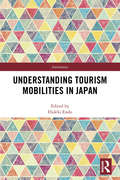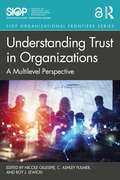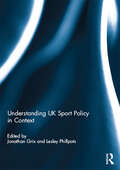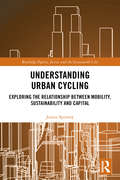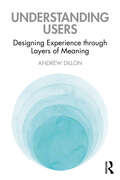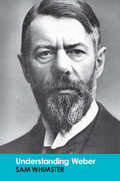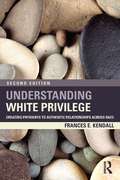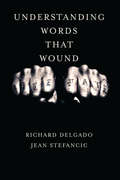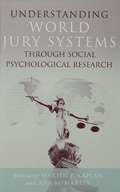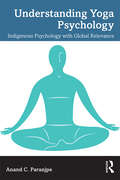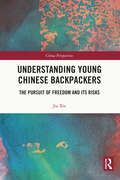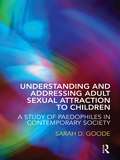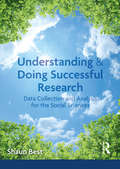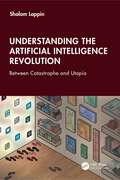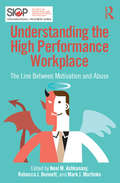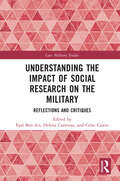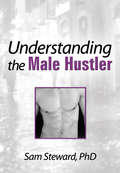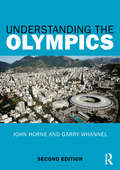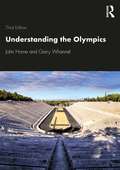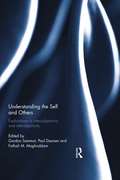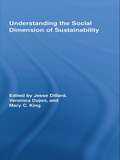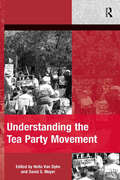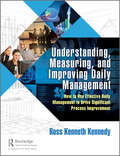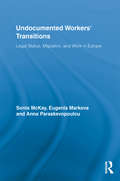- Table View
- List View
Understanding Tourism Mobilities in Japan (Antinomies)
by Hideki EndoThe total number of foreign tourists received in countries throughout the world was 530 million in 1995. That number broke through the 1 billion mark for the first time in 2012, at 1,035,000,000. In 2015, it reached 1,180,000,000. According to Anthony Elliott and John Urry, modern society has been characterized as being "mobile", and within that we are also living "mobile lives". In modern society, flows of people, things, capital, information, ideas and technologies are constantly occurring, and as they are merging like a violently rushing stream, what could be termed a landscape of mobilities has appeared. Social realities are in flux and are transforming to become different than they were before. This volume will expand the inquiry of tourism mobilities comprehensively and clearly from the fields of humanities and social sciences. In particular, tourism mobilities has been actively investigated up to now in the UK, US, Europe and Australia, but even though the Japanese body of literature contains a great many excellent studies of Japanese examples, there are almost no English-language articles presenting their results. Publishing examples of Japanese tourism mobilities will not only foster new and exciting lines of inquiry for existing and future research on tourism mobilities, but will also have implications for humanities and social sciences throughout the world.
Understanding Trust in Organizations: A Multilevel Perspective (SIOP Organizational Frontiers Series)
by Nicole Gillespie, C. Ashley Fulmer, and Roy J. LewickiUnderstanding Trust in Organizations: A Multilevel Perspective examines trust within organizations from a multilevel perspective, bringing together internationally renowned trust scholars to advance our understanding of how trust is affected by both macro and micro forces, such as those operating at the societal, institutional, network, organizational, team, and individual levels. Understanding Trust in Organizations synthesizes and promotes new scholarly work examining the emergence and embeddedness of multilevel trust within organizations. It provides a much-needed integration and novel conceptual advances regarding the dynamic interplay between micro and macro levels that influence trust. This volume brings new insights into how trust in groups, networks, and organizations forms, and why employees can differ in their trust in leaders and teams. Providing rich and nuanced insights into how to develop, maintain, and restore trust in the workplace, Understanding Trust in Organizations is a critical resource for scholars, graduate students, and researchers of industrial and organizational psychology, as well as practitioners in fields such as human resource management and strategic management.
Understanding UK Sport Policy in Context
by Jonathan Grix and Lesley PhillpotsThe London Olympics of 2012 acted as a focal point for an examination of UK sport policy. Individual chapters from leading specialists in their fields focus upon the central components of the UK‘smodel of sport - for example elite, school and community sport and talent ID policies - and discuss what kind oflegacy 2012 is likely to leave on the sports landscape in years to come. The conceptlegacy is a common theme running through all contributions which themselves stem from a wide variety of academic disciplines and sub-disciplines, including sport psychology, political science, sports studies, cultural studies and sociology. A wide range of topics and organisations are covered throughout the volume, including coaching, talent ID, school sports partnerships, PE and youth sport, participation in sport, the IOC and the Olympic Charter, the Olympic Movement and Islamic Culture and, finally, issues of regeneration through sports mega-events. This book was published as a special issue of the International Journal of Sport Policy.
Understanding Urban Cycling: Exploring the Relationship Between Mobility, Sustainability and Capital (Routledge Equity, Justice and the Sustainable City series)
by Justin SpinneyAcademic interest in cycling has burgeoned in recent years with significant literature relating to the health and environmental benefits of cycling, the necessity for cycle-specific infrastructure, and the embodied experiences of cycling. Based upon primary research in a variety of contexts such as London, Shanghai and Taipei, this book demonstrates that recent developments in urban cycling policy and practice are closely linked to broader processes of capital accumulation. It argues that cycling is increasingly caught up in discourses around Smart cities that emphasise technological solutions to environmental problems and neoliberal ideas on individual responsibility and biopolitical conduct, which only results in solutions that prioritise those who are already mobile. The central argument of the book is not that the popularisation of cycling is inherently bad, but that the manner in which cycling is being popularised gives cause for social and environmental concern. Ultimately the book argues that cycling has now become a vehicle for sustaining pro-growth agendas rather than subverting them or shifting to sustainable no-growth/de-growth and less technologically driven visions of modernity. This book makes an innovative contribution to the fields of Cycling Studies, Mobilities and Transport and will be of interest to students and academics working in Human Geography, Transport Studies, Urban Studies, Urban Planning, Public Policy, Sociology and Sustainability.
Understanding Users: Designing Experience through Layers of Meaning
by Andrew DillonGrounded in the user-centered design movement, this book offers a broad consideration of how our civilization has evolved its technical infrastructure for human purpose to help us make sense of our contemporary information infrastructure and online existence. The author incorporates historical, cultural, and aesthetic approaches to situating information and its underlying technologies across time in the collective, lived experiences of humanity. In today’s digital environment, user experience is vital to the success of any product or service. Yet as the user population expands to include us all, designing for people who vary in skills, abilities, preferences, and backgrounds is challenging. This book provides an integrated understanding of users, and the methods that have evolved to identify usability challenges, that can facilitate cohesive and earlier solutions. The book treats information creation and use as a core human behavior based on acts of representation and recording that humans have always practiced. It suggests that the traditional ways of studying information use, with their origins in the distinct layers of social science theories and models is limiting our understanding of what it means to be an information user and hampers our efforts at being truly user-centric in design. Instead, the book offers a way of integrating the knowledge base to support a richer view of use and users in design education and evaluation. Understanding Users is aimed at those studying or practicing user-centered design and anyone interested in learning how people might be better integrated in the design of new technologies to augment human capabilities and experiences.
Understanding Weber
by Sam WhimsterUnderstanding Weber provides an accessible and comprehensive explanation of the central issues of Weber's work. Using the most recent scholarship and editions of Weber's writings, Sam Whimster establishes the full range, depth and development of Max Weber's approach to the social and cultural sciences. This ground-breaking book: locates the central issues in Weber's writings and relates them to the golden era of social and cultural sciences argues that Weber remains the major exponent of the classical tradition still relevant today offers a new interpretation of the dynamic of Weber’s career as historian, social-economist, methodologist and sociologist. Weber's sociology still stands as a successful and valid underwriting of the substantive fields of power, law, rulership, culture, religion, civilizational configurations, and economic sociology. At a time of the turning away from grand theory to empirical policy studies, this book asserts the authority of Weber's conception and calls for a critical engagement with his legacy in order to understand the dynamics of a globalizing modernity. This is an indispensable guide to Weber's writings and will be an invaluable companion to The Essential Weber (2004). The book closely tracks the development of Weber’s thinking, an exploration that will make it an obligatory choice for undergraduate and postgraduate students as well as researchers in the fields of sociological theory, economic sociology and cultural studies.
Understanding White Privilege: Creating Pathways to Authentic Relationships Across Race (Teaching/Learning Social Justice)
by Frances KendallKnowingly and unknowingly we all grapple with race every day. Understanding White Privilege delves into the complex interplay between race, power, and privilege in both organizations and private life. It offers an unflinching look at how ignorance can perpetuate privilege, and offers practical and thoughtful insights into how people of all races can work to break this cycle. Based on thirty years of work in diversity and colleges, universities, and corporations, Frances Kendall candidly invites readers to think personally about how race — theirs and others’ — frames experiences and relationships, focusing squarely on white privilege and its implications for building authentic relationships across race. This much-anticipated revised edition includes two full new chapters, one on white women and another extending the discussion on race. It continues the important work of the first, deepening our knowledge of the recurring history on which cross-race relationships issues exist. Kendall’s book provides readers with a more meaningful understanding of white privilege and equips them with strategies for making personal and organizational changes.
Understanding Words That Wound
by Richard DelgadoWritten by leading critical race theorists Richard Delgado and Jean Stefancic, this volume succinctly explores a host of issues presented by hate speech, including legal theories for regulating it, the harms it causes, and policy arguments, pro and con, suppressing it. Chapters analyze hate speech on campus, hate speech against whites, the history
Understanding World Jury Systems Through Social Psychological Research
by Martin F. Kaplan Ana M. MartínThis volume examines diverse jury systems in nations around the world. These systems are marked by unique features having critical implications for jury selection, composition, functioning, processes, and ultimately, trial outcomes. These unique features are examined by applying relevant social psychological research, models and concepts to the central issues and characteristics of jury systems in those nations using a wide variety of jury procedures. Traditionally, research that has been conducted on juries has almost exclusively targeted the North-American jury. Psychologically-based research on European, Asian and Australian juries has been almost non-existent in the past decade or more. Yet, the incidence of jury trials outside of North America has been steadily increasing as more nations (e.g., Japan, Spain, Russia, and Poland) adopt, revise, or expand their use of juries in their legal system. Accordingly, research has been appearing in the scientific literature on new developments in world juries (particularly in Spain, Japan, and Australia). This volume fulfils the dual purpose of understanding the diverse practices in world juries in light of existing social psychological knowledge and applied research on juries in each nation, and outlining new research in the context of the issues raised by jury practices beyond those of North America.
Understanding Yoga Psychology: Indigenous Psychology with Global Relevance
by Anand C. ParanjpeThis book is an introduction to Patañjali’s Yoga Sūtras and its core concepts about the self, suffering and consciousness. It highlights its relevance to contemporary theories and applications in the fields of psychology and health. The book adopts sociology of knowledge as a broad framework as it delves into the core concepts of yoga psychology in the Yoga Sūtras in the context of worldviews and frameworks present in the Upanisads and the Sāṁkhya system. It provides an interpretation of Kriya Yoga and its practice in pursuit of spiritual upliftment, and concept of Samādhi or the transformation of consciousness using the language and idiom of contemporary psychology. It draws parallels between yoga psychology and the ideas of Husserl, Jung and Piaget while reconciling the seemingly disparate cultural, religious, spiritual, and intellectual traditions of eastern spirituality and schools of modern psychology. The book also discusses yoga psychology in relation to psychoanalysis, radical behaviorism as well as mainstream, cognitive, humanistic, transpersonal and indigenous psychologies and provides a guide to both the theories of yoga psychology and its applications. This book will be of interest to students, teachers, researchers and practitioners of psychology, psychiatry, philosophy and yoga psychology as well as to psychologists, psychiatrists, counselors, mental health professionals, clinical psychologists, and yoga enthusiasts.
Understanding Young Chinese Backpackers: The Pursuit of Freedom and Its Risks (China Perspectives)
by Jia XieAn activity that originated in Western societies, backpacking has gained increasing popularity among Chinese millennials. In a spirit of the ‘search for self’, young Chinese backpackers have sought to display their pursuit of freedom, independence and responsibility within an increasingly individualised society through backpacking. This volume investigates contemporary young Chinese persons’ views on backpacking culture and backpackers. A group of Chinese backpackers are studied using interview and participant observation, and focus groups are conducted to study young professionals’ and university students’ attitudes towards backpacking. The results indicate a profound cultural change along with a degree of division. On the one hand, the backpackers often begin their journey due to a desire to pursue freedom, and use the pursuit as a process of reflexive awareness; on the other hand, the risks of pursuing a freewheeling lifestyle within an individualised society drive the majority of them to return home. The author concludes that this phenomenon is a kind of ‘staged individualism’, describing how Chinese millennials strike a balance between individual interests and wider social obligations. Students and scholars of sociology tourism, and youth culture will be interested in this volume.
Understanding and Addressing Adult Sexual Attraction to Children: A Study of Paedophiles in Contemporary Society
by Sarah D. GoodePaedophiles exist and we must develop ways of living with this fact whilst ensuring that children are kept safe. This ground-breaking book demystifies the field of adult sexual attraction to children, countering the emotionality surrounding the topic of paedophilia in the popular media by careful presentation of research data and interview material. Addressing how we can work together to reduce sexual offending in this population, this text bridges the gulf in understanding between those who want to protect children and those who feel sexual attraction to children – and recognises that they are sometimes the same people. Sarah D. Goode provides an overview of the topic by defining the term 'paedophile' and discussing how many adults there may be in the general population who find themselves sexually attracted to children. She looks at how the Internet has acted as an enabler, with an explosion of child pornography and 'pro-paedophile' websites. Drawing on data from a sample of fifty-six self-defined paedophiles living in the community, she explores themes including self-identity, the place of fantasy and the forms of support available to paedophiles. Her research highlights the scale of debate within the 'online paedophile community' about issues such as the morality of sexual contact with children and encouragement to maintain a law-abiding lifestyle. Throughout, she draws careful distinctions between sexual attraction to children and sexual contact with children. The book concludes with a valuable discussion on how adult sexual contact harms children and examples of a range of initiatives which work to protect children and prevent offending. Suitable for all professionals who work with children or sexual offenders, this book gives clear guidance on what one needs to know and do to ensure children are kept safe. It will also be of interest to students studying child protection, paedophilia and child sexual abuse within other social science disciplines.
Understanding and Doing Successful Research: Data Collection and Analysis for the Social Sciences
by Shaun BestResearch Methods is an essential guide to carrying out a research project. Each of the focused chapters introduces and explains an aspect of social research to readers who may have no experience or knowledge of this subject. The emphasis is on 'how to do' various different methods, how to decide which is the most appropriate, and how to analyse the data. The book also includes examples of good practice from a range of social science disciplines.
Understanding the Artificial Intelligence Revolution: Between Catastrophe and Utopia
by Shalom LappinAfter many years during which it languished in relative obscurity, in remote classrooms of computer science departments and in small prototype projects for tech companies, artificial intelligence (AI) is now a searingly hot topic across the media. Yet much of the public discussion is so feverish that an understanding of the basic scientific and engineering elements of the field is easily lost, often resulting in exaggerated claims, as well as dangerously neglected threats.This concise and sober book presents a brief history of AI, explaining in clear language the central engineering innovations that have produced the current revolution. It distinguishes between imagined dangers and the very real problems that AI is creating. Spread across seven short and accessible chapters, this book explains the developments behind deep learning and the applications of deep neural networks (DNNs). It addresses both the imagined and actual risks posed by the AI revolution, before outlining the elements of a rational public policy on AI, covering topics like tech monopolies, disinformation, bias, hate speech, intellectual property rights, and inequality.Suitable for the general reader, Understanding the Artificial Intelligence Revolution: Between Catastrophe and Utopia is the ideal book for anyone seeking a clear and informed introduction to AI.
Understanding the High Performance Workplace: The Line Between Motivation and Abuse (SIOP Organizational Frontiers Series)
by Neal M. Ashkanasy Rebecca J. Bennett Mark J. MartinkoThis book asks the crucial question: When does high performance supervision become abusive supervision? As more organizations push to adopt high performance work practices (HPWP), the onus increasingly falls on supervisors to do whatever it takes to maximize the productivity of their work teams. In this rigorous, research-based volume, international contributors offer insight into how and when seemingly-beneficial workplace practices cross the line from motivation to abuse. By reviewing critical issues in both high performance work practices and abusive supervision, it illuminates the crossover between these two modes of work, and forges a path for future scholarship.
Understanding the Impact of Social Research on the Military: Reflections and Critiques (Cass Military Studies)
by Eyal Ben-AriThis book seeks to chart and evaluate the impact of social research on the military itself. By ‘impact’, the authors in this volume simply mean that which has a marked effect or influence on changing military policy, practices, knowledge, skills, behaviour, or living conditions. The book comprises a series of reflective contributions from scholars who have conducted research on the military as external scholars with no formal ties to the armed forces, as 'native' researchers formally linked to them, as well as various kinds of contracted social scientists enabled by the military to carry out their investigations. The authors were asked to make the question of the impact of social scientific research on the armed forces an object of study in itself and to situate their reflections in terms of wider analytical questions. As a result, the chapters can be divided, broadly speaking, into two types of orientation: some are centered on theoretical and analytical issues, while others focus on the researchers’ lived experiences. This book will be of interest to students of military studies, sociology, organisational studies, psychology and political science.
Understanding the Male Hustler
by Sam StewardThis book is a serious study of male hustlers using experiential dialogue to introduce the reader to real-life concepts and experiences that otherwise could not be effectively conveyed. An intriguing attempt to get into the mind and personality of the male hustler through a largely imagined series of dialogues between a well-known fictional hustler and his so-called amanuensis, Samuel Steward, this unique book covers all aspects of the hustler’s motivations, activities, life style, adjustments, advantages, and disadvantages. It accomplishes this dispassionately, without prejudgment, moral censure, approbation, or more than cursory involvement. Therapists and counselors in all fields of sexual functioning will find here some understanding of the causes and impulses (beyond the popular “broken home syndrome”) that lead young males into prostitution. It signals some of the signposts to danger and serious threats to health that accompany the profession of prostitution and also explains to counselors some of the activities and practices of the male prostitute, enabling them to have a better understanding of the fascination and peril of the hustler’s life. The brevity of success in such a calling is also considered, with some consideration for the necessity of long-range planning for the hustler’s future.Important contents: interview of a well-known hustler brief look at early male prostitution--Greek, Roman, Burton’s theory the peacock period and youth as a prerequisite for hustling lures of the profession--money, power, other motivations paths and mechanisms leading to hustling characteristics of different types of hustlers types of clients patronizing hustlers literary illuminations the modus operandi of the male hustler extraordinary dangers confronting the male hustler today the attractiveness of the “seeing-through” of a hustler to past clients quo vadis for the hustler after youth passes Readers will be amazed by the daily hazards and drawbacks as well fascinated by the curiosities and rewards of the hustler’s profession. Especially of interest to therapists and counselors, Understanding the Male Hustler is also valuable for sociologists, anthropologists, medical specialists, psychiatrists, psychologists.
Understanding the Olympics
by John Horne Garry WhannelThe Olympic Games is unquestionably the greatest sporting event in the world, with billions of viewers across the globe. How did the Olympics evolve into this multi-national phenomenon? How can the Olympics help us to understand the relationship between sport and society? What will be the impact and legacy of the 2016 Olympics in Rio? Now in a fully revised and updated new edition that places Rio 2016 in the foreground, Understanding the Olympics answers all these questions by exploring the social, cultural, political, historical and economic context of the Games. This book presents the latest research on the Olympics, including new material on legacy, sustainability and corruption, and introduces the reader to all of the key themes of contemporary Olympic Studies including: the history of the Olympics Olympic politics access and equity the Olympics and the media festival and spectacle the Olympic economy urban development Olympic futures. The most up-to-date and authoritative introduction to the Olympic Games, this book contains a full Olympic history timeline as well as illustrations, information boxes and ‘Olympic Stories’ in every chapter. Understanding the Olympics is essential reading for anybody with an interest in the Olympics or the wider relationship between sport and society.
Understanding the Olympics
by John Horne Garry WhannelHow did the Olympics evolve into a multi-national phenomenon? How can the Olympics help us to understand the relationship between sport and society? What will be the impact and legacy of the Olympics after Tokyo in 2020? Understanding the Olympics answers all these questions by exploring the social, cultural, political, historical and economic context of the Games. This thoroughly revised and updated edition discusses recent attempts at future proofing by the International Olympic Committee (IOC) in the face of growing global anti-Olympic activism, the changing geo-political context within which the Olympics take place, and the Olympic histories of the next three cities to host the Games – Tokyo (2020), Paris (2024) and Los Angeles (2028) – as well as the legacy of the London (2012) Olympics. For the first time, this new edition introduces the reader to the emergence of &‘other Games&’ associated with the IOC – the Winter Olympics, the Paralympics, and the Youth Olympics. It also features a full Olympic history timeline, many new photographs, refreshed suggestions for further reading, and revised illustrations. The most up-to-date and authoritative textbook available on the Olympic Games, Understanding the Olympics is essential reading for anybody with an interest in the Olympics or the wider relationship between sport and society.
Understanding the Self and Others: Explorations in intersubjectivity and interobjectivity
by Fathali M. Moghaddam Gordon Sammut Paul DaanenHow do we, as human beings, come to understand ourselves and others around us? This question could not be more timely or pertinent to the issues facing humankind today. At the heart of many of our world’s most troubling political and social problems lies a divergence, and sometimes a sharp contradiction, in perspectives between nations and cultural groups. To find potential solutions to these seemingly intractable divides, we must come to understand what both facilitates and hinders a meaningful exchange of fundamental ideas and beliefs between different cultural groups. The discussions in this book aim to provide a better understanding of how we come to know ourselves and others. Bringing together a number of cutting edge researchers and practitioners in psychology and related fields, this diverse collection of thirteen papers draws on psychology, sociology, philosophy, linguistics, communications, and anthropology to explore how human beings effectively come to understand and interact with others. This volume is organised in three main sections to explore some of the key conceptual issues, discuss the cognitive processes involved in intersubjectivity and interobjectivity, and examine human relations at the level of collective processes. Understanding the Self and Others will appeal to students and scholars of sociology, developmental psychology, philosophy, communication studies, anthropology, identity studies, social and cultural theory, and linguistics.
Understanding the Social Dimension of Sustainability (Routledge Studies in Development and Society)
by Veronica Dujon Jesse Dillard Mary C. KingThe imperative of the twenty-first century is sustainability: to raise the living standards of the world's poor and to achieve and maintain high levels of social health among the affluent nations while simultaneously reducing and reversing the environmental damage wrought by human activity. Scholars and practitioners are making progress toward environmental and economic sustainability, but we have very little understanding of the social dimension of sustainability. This volume is an ambitious, multi-disciplinary effort to identify the key elements of social sustainability through an examination of what motivates its pursuit and the conditions that promote or detract from its achievement. Included are theoretical and empirical pieces; examination of international and local efforts; discussions highlighting experiences in both the developing and industrialized nations; and a substantial focus on business practices. Contributors are grounded in sociology, economics, business administration, public administration, public health, geography, education and natural resource management.
Understanding the Tacit (Routledge Studies in Social and Political Thought #81)
by Stephen P. TurnerThis book outlines a new account of the tacit, meaning tacit knowledge, presuppositions, practices, traditions, and so forth. It includes essays on topics such as underdetermination and mutual understanding, and critical discussions of the major alternative approaches to the tacit, including Bourdieu’s habitus and various practice theories, Oakeshott’s account of tradition, Quentin Skinner’s theory of historical meaning, Harry Collins’s idea of collective tacit knowledge, as well as discussions of relevant cognitive science concepts, such as non-conceptual content, connectionism, and mirror neurons. The new account of tacit knowledge focuses on the fact that in making the tacit explicit, a person is not, as many past accounts have supposed, reading off the content of some sort of shared and fixed tacit scheme of presuppositions, but rather responding to the needs of the Other for understanding.
Understanding the Tea Party Movement (The Mobilization Series on Social Movements, Protest, and Culture)
by Nella Van DykeHailing themselves as heirs to the American Revolution, the Tea Party movement staged tax day protests in over 750 US cities in April 2009, quickly establishing a large and volatile social movement. Tea Partiers protested at town hall meetings about health care across the country in August, leading to a large national demonstration in Washington on September 12, 2009. The movement spurred the formation (or redefinition) of several national organizations and many more local groups, and emerged as a strong force within the Republican Party. Self-described Tea Party candidates won victories in the November 2010 elections. Even as activists demonstrated their strength and entered government, the future of the movement's influence, and even its ultimate goals, are very much in doubt. In 2012, Barack Obama, the movement’s prime target, decisively won re-election, Congressional Republicans were unable to govern, and the Republican Party publicly wrestled with how to manage the insurgency within. Although there is a long history of conservative movements in America, the library of social movement studies leans heavily to the left. The Tea Party movement, its sudden emergence and its uncertain fate, provides a challenge to mainstream American politics. It also challenges scholars of social movements to reconcile this new movement with existing knowledge about social movements in America. Understanding the Tea Party Movement addresses these challenges by explaining why and how the movement emerged when it did, how it relates to earlier eruptions of conservative populism, and by raising critical questions about the movement's ultimate fate.
Understanding, Measuring, and Improving Daily Management: How to Use Effective Daily Management to Drive Significant Process Improvement
by Ross KennedyUnderstanding, Measuring, and Improving Daily Management explains the critical parts of a continuous improvement strategy to achieve Operational Excellence and where reactive improvement through effective daily management fits in. In addition, it shows the consequences to your Operational Excellence journey if daily management is not performed well. Reactive improvement develops the capability and discipline within the organization to be able to rapidly recover from an event or incident that stops you from achieving your expected or target performance for the day, shift, or hour and most importantly -- your ability to capture the learning and initiate corrective actions so that the event or incident will not re-occur anywhere across the organization. As such, reactive improvement focuses on improving daily management through your daily review meetings, your information centers supporting the daily review meetings, and your frontline problem-solving root cause analysis capability at all levels. The book introduces the seven elements of reactive improvement that must work in concert for effective daily management and allows the reader to rate their site or department to determine their starting point compared to best practices: 1. Supportive organization structure to support development of your people so they have ownership and accountability for the performance of their area of responsibility; 2. Effective frontline leaders to ensure everyone else in the leadership structure are not working down a level; 3. Appropriate measures with expected targets that are linked to the site’s Key Success Factors for Operations to ensure goal alignment, and are relevant to the area being focused on; 4. Structured daily review meetings to identify opportunities (problems/incidents) and monitor progress of their solution so they don’t happen again; 5. Visual information centers that visually display daily and trending performance along with monitoring of actions to address problems/issues raised; 6. Frontline problem-solving root cause analysis capability across the site; and 7. Rapid sharing of learning capability across shifts, departments, and the organization. The author outlines in detail why each of the seven elements are important to achieving Operational Excellence, and most importantly, how to implement each element supported with many templates and tools.
Undocumented Workers' Transitions: Legal Status, Migration, and Work in Europe (Routledge Advances in Sociology)
by Sonia McKay Anna Paraskevopoulou Eugenia MarkovaThis book explores how immigration laws, while aimed at discouraging undocumented migration, actually sustain it. It documents the circumstances that have caused previously documented migrants to become undocumented and explores the impact of their changing status on their families and on their own employment opportunities. The authors argue that undocumented migrants are forced into the most precarious types of work, and changes in the way that employment is organised, with a shift into temporary, agency and sub-contracted work, makes undocumented migrants particularly attractive in some employment markets. This groundbreaking volume draws substantially on data collected from a two-year research study in seven European countries that was focused on understanding the impact of migration flows on EU labour markets.
